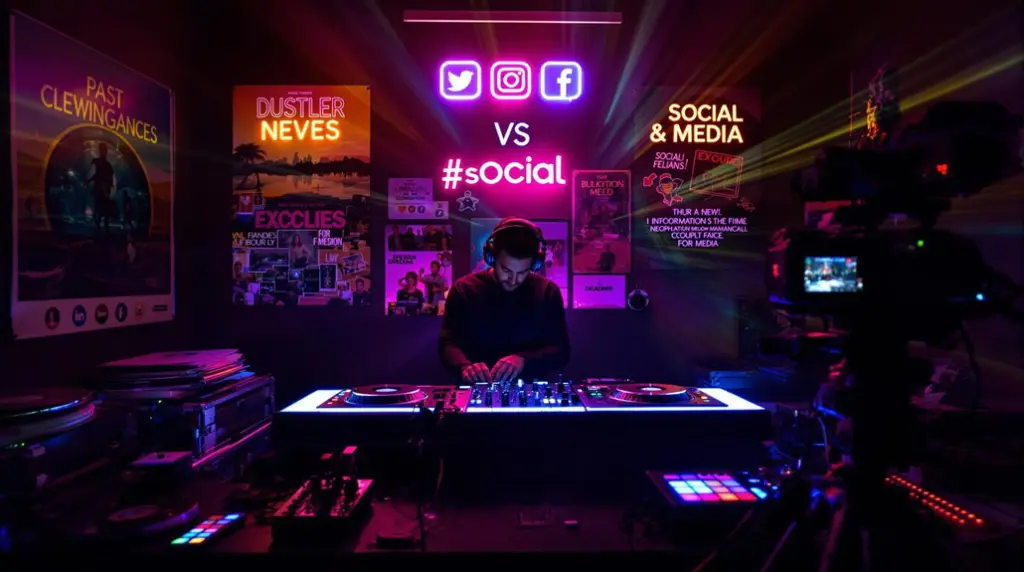To secure legal DJ remix permissions, start by understanding copyright basics: know the scope of rights, and the implications of infringement. Next, identify the original copyright holder; explore platforms like Spotify or consult song credits to find the correct contact. Write a clear and professional permission request, specifying your remix intentions. Negotiate licensing agreements thoughtfully, understanding potential costs and stipulating clear contract terms. Consider compulsory licenses for more standardized terms. Handle denials respectfully and explore alternatives. Always document permissions and agreements meticulously. Further exploration will reveal deeper insights into maneuvering these legal waters effectively.
Key Takeaways
- Conduct thorough research to identify and contact the original copyright holder for permission.
- Draft a formal, detailed permission request outlining the purpose and scope of your remix.
- Explore compulsory licensing options if direct permission is unattainable.
- Negotiate clear licensing agreements, including royalty splits and upfront fees.
- Maintain detailed records of all permissions and agreements for legal compliance and transparency.
Understand Copyright Basics
To navigate the legal landscape of remixing music, it’s crucial you understand copyright basics, which govern ownership rights, protection, and permissions for creative works. As a DJ looking to remix, you’re dealing with intellectual property—a legal framework that guarantees the original creators control how their works are used. This includes exclusive rights to reproduce, distribute, and create derivative works, such as remixes.
You must be cautious of copyright infringement, which can lead not only to legal consequences but also to the removal of your content from platforms. To avoid this, familiarize yourself with the concept of fair use interpretation, which allows limited use of copyrighted material without permission under specific conditions, such as for commentary, criticism, or educational purposes. However, fair use is often ambiguous and depends heavily on the context, making it a risky area without proper legal advice.
Additionally, consider using public domain works, which are no longer under copyright protection and free to use. There are also fair dealing exceptions in some jurisdictions, similar to fair use, that provide more concrete guidelines but vary from country to country. Understanding these aspects will help you remix legally and ethically, respecting the rights of original creators while fostering your creative expression.
Identify the Original Copyright Holder
Identifying the original copyright holder of a song is your first step toward legally remixing music. To start, you’ll need to engage in thorough copyright research. Platforms like Spotify and various music databases can be invaluable tools. They often list the rights holders directly in the song credits, giving you a precise starting point for your rights investigation.
Once you’ve pinpointed who holds the copyright, the next phase is to contact them directly. This could be the artists themselves, their A&R managers, or the publishing companies that represent them. It’s important to approach this step with professionalism and precision.
Draft a Formal Permission Request
Once you’ve identified the original copyright holder, crafting a formal permission request is your essential next step. You must clearly articulate the purpose of your remix in this document. It’s important that you demonstrate an understanding of remix etiquette and the permission process. This isn’t just about legal obligations; it’s also about respecting the ethical considerations involved in manipulating another artist’s work.
In your request, include a detailed description of your remixing experience and any notable previous work. This establishes credibility and assures the copyright holder of your competence and professionalism. Specify exactly how you plan to credit the original artist in your remix, as this shows respect for their original creation and adherence to ethical norms.
Moreover, you should offer to share the final remix with the copyright holder for approval before its public release. This step is essential as it involves them in the process and addresses potential concerns proactively.
Lastly, always express gratitude for the opportunity to remix the song. A polite and appreciative tone can greatly influence the decision-making process, ensuring that your request is received in the best possible light.
Negotiate Licensing Agreements
As you navigate the intricacies of licensing agreements, it’s essential to comprehend the costs involved.
You’ll need to identify the right holders to negotiate terms that are fair and legally sound.
This process guarantees that your remix complies with copyright laws while properly compensating all contributing parties.
Understanding Licensing Costs
Understanding the intricacies of licensing costs is crucial when negotiating agreements for remix permissions. Licensing fees for remixes vary widely—from as little as $100 to up to $20,000. This variation hinges on factors such as the original track’s popularity and the negotiation prowess employed.
You’ll need to conduct a thorough cost comparison to make sure you’re getting a fair deal. Effective negotiation strategies involve grasping the value of your remix and its potential market earnings. By understanding these elements, you can argue for more favorable terms, whether that’s lowering upfront fees or securing a better royalty split.
Always aim for detailed contracts that clarify terms, payment schedules, and rights to avoid future legal hassles and ensure transparency.
Identifying Right Holders
To secure the necessary permissions for remixing, you must first identify and contact the copyright owners of the original track. Utilize platforms like Spotify or specialized databases as your primary research techniques to pinpoint these rights holders, which could range from artists to A&R managers or publishing companies.
Once identified, the contact methods typically involve drafting a professional email. This email should clearly articulate your intentions and propose terms, adhering to the essential requirements of the permission process. It’s vital to insist on a written contract that outlines the agreed-upon terms, ensuring all parties’ rights are protected.
Explore Compulsory License Options
You’ll need to grasp the essentials of compulsory licenses, which permit the use of copyrighted material under predefined conditions without direct permission from the copyright holder.
Acquiring a compulsory license involves understanding and meeting these specific conditions set forth by the Copyright Royalty Board.
Recognizing the benefits of compulsory licensing can greatly streamline your process of creating legal remixes and covers.
Understanding Compulsory Licenses
Exploring compulsory license options is essential for DJs and music creators who wish to use copyrighted works legally in their remixes and covers. These licenses are a gateway to both legal compliance and fair compensation. They guarantee that original creators are paid while allowing new interpretations of their work.
Here’s what you need to know:
- Compulsory licenses cover specific uses like cover songs, ensuring you’re on the right side of the law.
- They require adherence to set regulations, providing a structured approach to music creation.
- The process is streamlined, avoiding complex negotiations with rights holders.
- Understanding these licenses is essential for navigating the complexities of copyright laws effectively.
Acquiring a Compulsory License
Acquiring a compulsory license requires understanding the specific conditions under which you can remix copyrighted works legally. You’ll need to determine if the original work qualifies under the compulsory licensing provisions.
This path allows you to use copyrighted material without direct permission, but you must adhere to certain legal requirements, including the mandatory payment of set royalties. It’s essential to research the specific requirements and limitations of compulsory licenses for remixing in your region. This guarantees compliance with copyright regulations and supports the legal framework of remix culture.
Benefits of Compulsory Licensing
After understanding how to obtain a compulsory license, consider the advantages it offers for legally remixing and releasing music. This route not only streamlines your creative endeavors but also guarantees that you’re on the right side of the law.
Here are key benefits:
- Creative Freedom: You’re free to experiment with and reinterpret copyrighted songs without fearing legal repercussions.
- Legal Protection: A compulsory license shields you from copyright infringement claims, providing peace of mind as you release your remixes.
- Simplified Process: The clear, government-regulated framework saves you from the hassle of negotiating directly with rights holders.
- Industry Standards: Rates and terms are predefined, allowing you to plan your project budget more effectively.
Handle Denials and Restrictions
When faced with a denial of permission to remix a track, it’s important to respect the copyright owner’s decision and consider alternative options. Handling refusals gracefully not only maintains professional relationships but also protects you from potential legal repercussions. Seek alternatives by exploring other songs or artists who might be more amenable to granting remix permissions. This approach not only broadens your creative horizons but also builds a repertoire with diverse musical styles and origins.
It’s vital to avoid the temptation to proceed with remixing without proper authorization. Doing so can lead to serious legal consequences, including lawsuits and financial penalties, which could harm your reputation and career. Instead, focus on improving your skills in remixing. Use the time to experiment with different techniques or genres within the bounds of legally obtained material.
Engaging with copyright owners who are open to collaborations can provide valuable opportunities for growth and exposure. Compliance with copyright laws isn’t just about adhering to legal standards; it’s about fostering ethical practices within the music industry. By respecting these boundaries, you set a professional standard and contribute positively to the creative community.
Document All Permissions and Agreements
You must meticulously document all permissions and agreements to guarantee clarity and provide legal protection in potential disputes. This step isn’t just about covering your tracks; it’s about setting a foundation for fair, transparent, and professional relationships within the music industry.
Here’s how you should approach it:
- Collect Written Confirmations: Always secure written contracts or email confirmations for every permission. Legal documentation like this serves as the bedrock for permission verification and underscores your commitment to professionalism.
- Record Verbal Agreements: If a verbal agreement is made, follow up with a written confirmation. This can be an email summarizing the discussion or a more formal document outlining the agreed terms. Voice recordings can also be a viable form of legal documentation if both parties consent.
- Detail Financial Terms: Clearly document any financial arrangements such as royalty splits, upfront fees, and other compensations. This precision ensures everyone understands the financial stakes and obligations involved, preventing future disputes.
- Maintain Ongoing Records: Keep a dedicated file for each project where all related permissions and agreements are stored. Regular updates to this file will help in tracking changes and maintaining a clear timeline of agreements.
Frequently Asked Questions
How Do You Avoid Copyright on Remixes?
To avoid copyright infringement on remixes, you must verify they meet fair use criteria as transformative works. Analyze each element critically, determining if your remix adds new expression or meaning to the original.
How Do DJS Remix Songs Legally?
To legally remix songs, you must secure sync and master licenses, often via licensing agencies. Participating in remix contests can also provide legal avenues as permissions are typically cleared beforehand for contestants.
How Do DJS Avoid Copyright Infringement?
To avoid copyright infringement, you need to conduct a fair use evaluation and work with licensing agencies. It’s essential to secure permissions or licenses before using copyrighted music in your remixes.
How Do DJS Get Permission to Play Music?
To get permission to play music, you’ll need to focus on license acquisition and venue agreements. Secure licenses from rights organizations or directly contact rights holders to guarantee legal compliance and artist support.
Conclusion
Exploring the legal landscape of DJ remixes can seem challenging, but you’re well-equipped with these strategies.
Always start by understanding copyright essentials and pinpointing the original copyright holder. A carefully drafted permission request sets a professional tone.
If you encounter denials, don’t get discouraged; explore compulsory licenses as a fallback. Remember, documenting every agreement and permission is vital for legal protection.
With these steps, you’re on your way to legally sound remixing.




